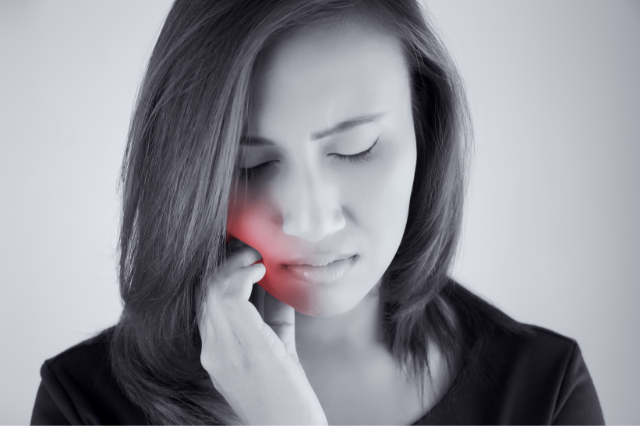What to Do if You Have a Toothache

There is nothing worse than waking up and feeling the sharp, pressurized pain of a toothache. Whether it be from an upper or lower tooth, a toothache can make one feel as though pain is occurring all over their body - from a headache, to ears, and sinus pain. Within this post, we’ll break down what exactly a toothache is and provide some tips on how to effectively deal with the pain.
What Is A Toothache?
According to The Cleveland Clinic, a toothache is “a pain in or around a tooth. Minor toothaches can come from a temporary gum irritation that you can treat at home. More serious toothaches are caused by dental and mouth problems that won’t get better on their own and will need to be treated by a dentist.”
A toothache is usually painful because the nerves inside of the tooth, referred to as the pulp, are irritated and full of bacteria. The pulp nerves consist of a soft material and are some of the most sensitive nerves in the body, therefore making toothaches so painful.
What Causes A Toothache?
A toothache can be caused by a variety of different ailments, both serious and non-serious. Some examples include:
-
Tooth decay
-
Abscessed tooth (a bacterial infection inside the center of the tooth).
-
A broken or fractured tooth
-
A damaged filling
-
Teeth grinding
-
Infected gums
-
Tooth eruption or removal
Tips For Effectively Treating Toothache Pain
The constant, sharp, throbbing pain caused by a toothache can seem unbearable, but there are home remedies you can take to feel better fast.
-
Start with NSAID and other pain-relieving medications. Taking NSAIDs (non-steroidal anti-inflammatory drugs) such as Advil, Aleve, or any other type of ibuprofen pain-relieving medication can mask the symptoms of a toothache and help get you on the road to recovery. If you can't take an NSAID, you can try an acetaminophen like Tylenol to receive the same results. It is important to read and follow the drug warnings and directions of any medication you take.
-
Rinse. You can rinse your mouth with multiple different liquids to treat toothache pain. If you want to start with something strong, rinse with hydrogen peroxide (3% solution). Be sure to dilute the hydrogen peroxide with water and do not swallow it. Rinsing with this will reduce pain and inflammation. Rinsing with warm saltwater will also help with toothache pain as it fights bacteria and reduces inflammation. Be sure to gargle the saltwater mixture and spit out versus swallowing.
-
Apply Pressure With A Cold Compress. Applying pressure to your toothache with a cold compress can also reduce pain and inflammation. You can use a rag, bath towel, or paper towel as a compress. Leave on for twenty minutes and then off for twenty minutes.
If you’re interested in natural remedies to relieve your toothache pain, you can also try applying vanilla extract with a cotton ball to the affected area and holding a warm bag of peppermint tea to the site of the pain.
In conclusion, having a toothache is never fun and the pain can cause interruption to your daily life. Try these home remedies to reduce pain and heal quicker. And, be sure to check out our services at Carolina Family Dental to help keep your smile healthy!